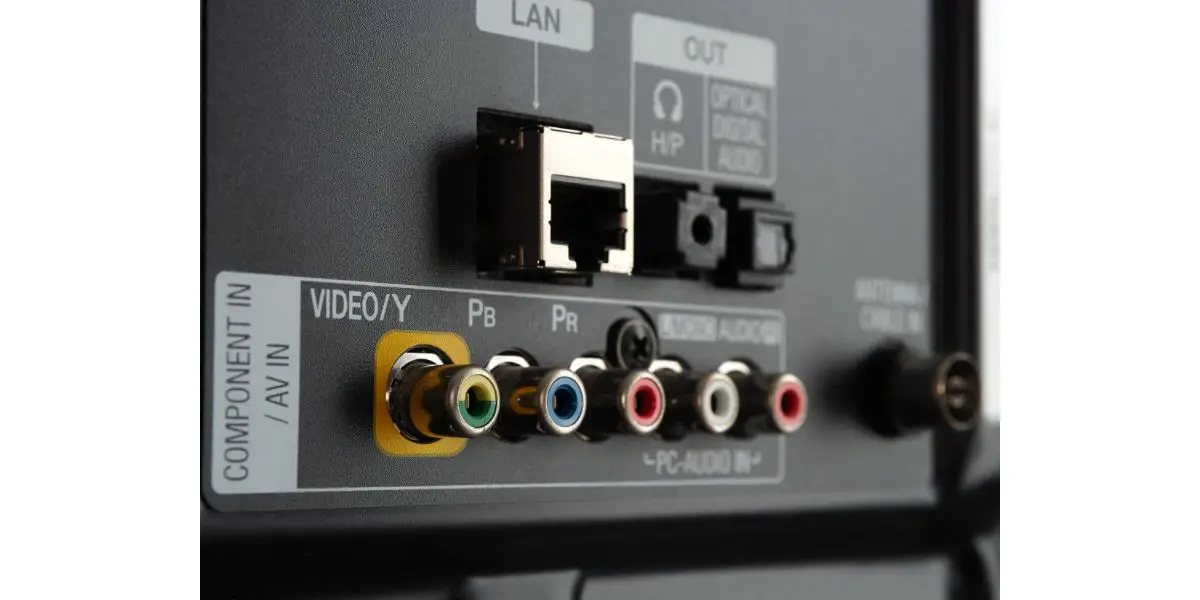Disclaimer: This post may contain affiliate links, meaning we get a small commission if you make a purchase through our links, at no cost to you. For more information, please visit our Disclaimer Page.
Modern TVs let you recreate the thrill and fun of being in a movie theater, especially when you have a home entertainment system with surround sound speakers. Even if you don’t use other components, your TV can produce static sounds that make it impossible for you to hear your shows, movies, and games. Look at the causes of static TV noises and the top solutions to those sounds.
Table of Contents
Why is My TV Making Static Noises? (6 Causes)
Static noises can range from a tiny crackling sound you barely hear to a louder cracking noise that interferes with your speakers. No matter how loud those noises sound, they usually relate to several issues.
1. Electronic Interference
The first thing to check is for any signs of electronic interference. Did the sounds start after you added a new video game console to your living room?
Maybe you moved your PC closer to the TV or added a new set of speakers. Any electronic devices that are close to the TV can cause static sounds. They can even cause interference if they are in a different room near the TV.
2. Coaxial Cable
A TV uses a coaxial cable, whether it has a satellite or cable connection. This cable sits in the ANT IN port and sends the signal from your TV provider to the TV.
You will likely hear some static sounds if the coaxial cable is loose. You can also hear these noises if the cable is in the port but falling out.
3. Loose Power Supply
The power supply is one of the most important parts of your TV. It carries a consistent power flow from the outlet or surge protector to the TV.
If it is too loose, it can cause your TV to flicker or shut down. A loose power supply can also cause the static noises you hear. The supply might be loose in the outlet or the back of the TV, especially if you moved it recently.
4. Defective Cables
One or more defective cables can also cause static noises. You might skip over this cause because you didn’t add anything to your system.
But the problem doesn’t always appear overnight. It can happen weeks and even months after you move your TV or add any new component.
5. TV Speakers
Your TV speakers can also cause static noises. Modern TVs use built-in speakers that are usually loud enough for most homes.
If they are too low, you can use an external pair of speakers, connect it to a surround sound system, or use a sound bar. Crackling static noises often indicate a problem with your speakers.
6. Poor Audio Settings
Pressing the Menu button on your remote lets you access the audio settings. You can then adjust the bass and other settings to improve your audio quality.
Poor audio settings can also produce crackling sounds and other noises because your TV speakers do not respond well to those settings.
What Can I Do to Fix Tv Static Noises? (7 Potential Fixes)
No matter how long you hear static sounds from your TV, you can eliminate them and improve your audio quality. While some solutions are easy, others require a little more work.
1. Reset Your TV
Before you do anything else or try any other solution, reset your TV. Use the remote to turn off the TV, and remove the power supply cord from your surge protector or outlet.
Let the TV sit unplugged for a minimum of 60 seconds. TVs with a projector or lamp should sit for five to 10 minutes, giving them time to cool down.
Plug the cord into the wall and turn the TV back on to check if there are still sounds. Always check with the cable plugged into the wall before using the surge protector, as the protector may cause odd noises.
2. Replace Your Speakers
If you use external speakers with your TV, now might be the best time to replace them. Speakers consist of different parts that make your audio clearer and brighter.
Those static sounds you hear can indicate that the speakers blew out. Go ahead and unplug the speakers or turn them off.
You can then turn on your TV and see how it sounds. Try the same thing if you have a soundbar.
You’ll also want to check the cables for those components, as even one blown cable can change your TV’s audio quality.
3. Check Your Cables
Go ahead and check any of the cables plugged into your TV. Unplug the coaxial cable and insert it back into the ANT In port.
There’s always a chance that someone screwed it into the wrong port or that they didn’t tighten it. You should screw the band tightly and ensure it doesn’t wiggle when you move it.
This cable will have either a gold or silver band around the end. Make sure the band sits flush with the back of your TV.
4. Adjust Your Audio Settings
Changing your TV’s audio settings may also remove any static noises. Press the Menu button on your remote control. Then scroll through the options to reach your Audio Settings.
Bring down the bass and treble to see if that helps. If anyone in your home recently changed your audio settings, your TV can sound different.
You may not even realize the changes happened until you watch a new movie or use a different app. Movies on Netflix often have scenes with actors talking that sound much lower than battle and action scenes do.
5. Replace the Cables
Before spending a lot of money on new cables, find out if one of those cables produces all the static sounds. When you unplug the coaxial cable, try turning on the TV and letting it play.
You might need to hook up a game console or a streaming device. If the cable is defective, you will only hear those noises when you use the cable.
Check the cables that connect other devices to your TV, too. Any defective or damaged cable can produce some static noises when you use it with your TV.
6. Look for Broadcast Issues
Your broadcast source can produce some static sounds. Whether you have a cable or satellite connection, you want to check the connection before you worry about buying a new TV or speakers.
Change your source to try a streaming app or watch a movie on your game console. If you only hear noises when you use your receiver, you have a problem with that component.
Make sure that you also lower your TV volume. Try changing the channel for sounds you hear when watching cable or satellite TV. You might find that the noises only occur on certain channels.
7. Get Rid of Electrical Interference
Electrical interference can often cause a lot of problems. Not only does it produce static sounds, but it can weaken the internet signal that goes to the TV and cause the screen to flicker.
Try moving any electrical objects away from your TV. This includes speakers and other parts of your surround sound system, computers, and small appliances. Leave your TV turned on as you move each item to see its effect on it.
Can Static Ruin a TV?
Static noises usually won’t ruin a TV, but static electricity can cause much damage. If you have static buildup in your home and touch the TV, you risk the picture turning off and not returning.
It can also cause the screen to flicker. This often happens because the electricity goes above the maximum voltage of the TV. While the static noises you hear should not ruin or damage your TV, you still need to take care of them.
FAQs
Why is static black and white instead of multicolored on a color television?
When a color television receives a signal with no valid color information, it displays black-and-white static instead of multicolored static.
This is because the color circuits of the television receive a synchronization signal called a “colorburst” that indicates the presence of a color signal.
If the colorburst is not present, the color circuits are turned off, and the television displays only the signal in black and white.
How come the TV makes static noise when turned off?
Firstly when a TV is made up of plastic and metal materials. These can expand and contract due to temperature changes. So when you turn off your TV, it cools down, and internal parts can contract.
This friction causes some parts to rub against each other, creating that static noise. Here are some causes:
- Is your TV directly facing an Air conditioner or heater?
- Is your TV on for hours on end? This can cause the Tv to overheat if it doesn’t have proper ventilation
- Is your TV on a leveled and flat surface? An uneven placement of the TV can cause this noise.
Conclusion
Make sure that you go over all the common causes of the static noises you hear coming from your TV to get an idea of what causes them, you can then use our solutions to fix the problem and get your TV back to normal.


